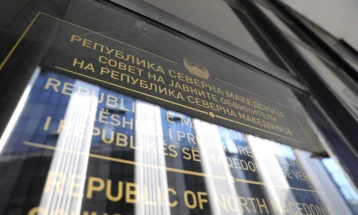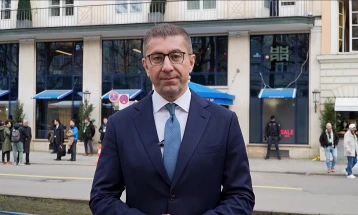National Bank not informed on talks between banks and government over Hungarian loan
- The National Bank does not know the details of the talks between the banks and the government regarding the Hungarian loan and is not involved in this process at all, Governor Anita Angelovska-Bezhoska said Thursday, adding that the Bank will be able to take a stance once it receives more detailed information.

Skopje, 7 November 2024 (MIA) – The National Bank does not know the details of the talks between the banks and the government regarding the Hungarian loan and is not involved in this process at all, Governor Anita Angelovska-Bezhoska said Thursday, adding that the Bank will be able to take a stance once it receives more detailed information.
“We are not involved in this process. We do not know the details of the discussions. Once we have more detailed information about the talks and the agreement between the banks and the government, we will be able to take a stance,” Angelovska-Bezhoska told reporters after presenting the autumn macroeconomic projections.
Regarding the government's plans for additional borrowing, the governor pointed out that lowering the budget deficit is crucial for stabilizing public debt.
In this context, she reiterated the recommendations from international financial institutions, including gradual fiscal consolidation, gradual monetary easing in line with fiscal consolidation, and acceleration of structural reforms.
“In our projections, we consider the latest fiscal strategy, which was recently adopted and sets a course for fiscal consolidation. This plan includes reducing the budget deficit from 4.9% this year to approximately 3% by 2027. Reducing the budget deficit is undoubtedly crucial for stabilizing public debt,” she noted.
She reiterated that public finance stability is crucial for two reasons: ensuring the medium-term sustainability of the public sector (enabling the state to prepare and strengthen its capacity to face future shocks) and supporting monetary policy.
She noted that the more prudent the fiscal policy, the greater the room for easing monetary policy, thus providing better conditions to companies and citizens through lower interests rates.

"Any policies that impact aggregate demand can also influence inflation. Considering the high openness of our economy and the large share of food and energy prices in our inflation index, just over 50%, it is clear that the global context and geopolitical risks, which could significantly affect the prices of basic products, remain a key risk. There is still a need for prudent domestic macroeconomic policies that can impact aggregate demand, especially labor market policies, as well as intensity with which structural reforms are implemented," Angelovska-Bezhoska said.
According to the autumn projections of the National Bank, foreign exchange reserves have reached 4.9 billion euros, which is just above four months' worth of imports of goods and services. This is regarded as a completely sufficient level and is in line with the monetary strategy aimed at maintaining a stable exchange rate of the domestic currency to the euro.
In terms of foreign direct investment, the medium-term projections stand at 4% of GDP.
“This is similar to the past two years, or slightly below the 4.3 percent average. The performance remains strong, and the first half of this year exceeded our expectations. Private transfers surpassed two billion euros last year, marking the highest historical level, so we are more cautious in the medium term and expect them to stabilize,” Angelovska-Bezhoska said.
Photo/video: MIA







